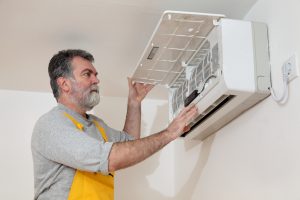Beat the Heat and Humidity: Floridians Take On Air Conditioning
For Floridians, air conditioning isn’t a luxury — it’s as necessary as oxygen! Soaring humidity levels and scorching summer temperatures keep many Floridians indoors to avoid the worst of the swampy weather. Average temperatures in the Sunshine State range from 64 to 74 degrees Fahrenheit during winter and 80 F to 92 F during summer, with humidity levels averaging 73 to 90 percent. Let’s face it. With that weather, air conditioning is like another family member — it’s vital to everyday life. Other than keeping HVAC systems in tip-top shape, how do Floridians beat the heat? With some summer survival tips, of course!
 Survival Tips
Survival Tips
No matter how amazing your air conditioning is, you eventually have to venture outside. When you do:
1. Stay Hydrated
If you’re undergoing HVAC installation or repairs or you simply plan to spend time outside, the number-one way to survive Florida’s climate is to drink plenty of water. While your spirit might want to head to Margaritaville, your body needs to replenish electrolytes, which you lose while you’re sweating under the hot Florida sun.
2. Consider Your Timing
When you want to go for a walk, run or do anything strenuous outside, time it for early morning or evening. Otherwise, once the high heat kicks in, you’ll feel like you’re broiling.
3. Wear Cooling Clothing
Stick with breathable fabrics that won’t cling to your body. Light colors help you feel cooler, moisture-wicking materials can help keep you dry and sunglasses shield your eyes from the glare of the sizzling sun. Don’t forget sunscreen!
Maintaining HVAC Systems
Before HVAC installation was possible, not many people lived in Florida. Without air conditioning, not many folks would stick around for the summer even today! Fortunately, HVAC systems are widely available now. With a little maintenance, you can chill out for many seasons to come.
1. Clean and Replace Filters Regularly
Prevent HVAC systems from becoming overworked — which could put your system at risk for a dreaded breakdown — by showing some love to your HVAC system’s filters. Dirty, clogged filters not only make HVAC systems work harder, but they also reduce airflow. That means you won’t be as cool as you want to be.
2. Free Up the Compressors
To stay cool, you need to make sure your unit’s outdoor compressor stays free of all shrubs, plants and other debris. Thoroughly check and remove foliage in spring and fall.
3. Have a Reputable Service Company on Speed Dial
HVAC installation, repairs, tune-ups — service companies can do it all. Living in Florida, you already know how important it is to have a reliable company on call if your air stops working or you need professional maintenance to keep the cool air flowing.
Cox Heating & Air Conditioning has been providing expert professional services to Hillsborough and Pinellas counties since 1958. If you have questions or need help beating the heat, visit our website to learn more or schedule an appointment today.
Entertaining Indoors and Out with Central Air Conditioning
Whether you’re planning some fun in the sun or a night under the stars, summer’s heat adds a challenging element to entertaining. You want your guests to be comfortable, but you don’t want to send your central air conditioning into overdrive — or your utility bills soaring. To keep your summer parties going strong without busting your budget, we rounded up some of our coolest entertaining tips that beat the heat without leaving your guests sweating it out.
Location, Location, Location
When your AC service Tampa team is installing your HVAC system, have them place the central air conditioning’s outdoor unit away from your outdoor entertaining space. Otherwise, every time you have friends or family over, you’ll deal with some noise while the unit is on and notice the bulky appearance of the condenser unit. Instead, ask your AC service Tampa team to place the unit away from your entertaining area in a shaded spot to keep the unit cooler so it doesn’t work as hard to chill your home.
Don’t Leave Doors Open
During an outdoor party, it may be tempting to prop the door open to make it easier to carry things in and out, or even to let a little cool air out to the entertaining space. This choice undermines your central air conditioning’s ability to operate efficiently. It can also result in your unit having to work harder to remove humidity from the air, which could leave it vulnerable to unnecessary stress or breakage.
Keep the House Cooler Without Cranking the A/C
In addition to keeping your windows and doors closed, there are two main ways to keep your home cooler: do your cooking outside, and avoid baking during the heat of the day. Grilling is perfect for summer entertaining, so plan to cook outside instead. Use a slow cooker to keep party foods warm or cook main dishes and sides at low temperatures without heating up the kitchen. Likewise, baking raises the temperature of your home. If you want to bake something special, try to get it in and out of the oven at night or in the early part of the morning when temperatures are cooler.
Keep Guests Cool and Comfortable
Does the summer heat send you running to the thermostat to crank up the A/C? You don’t have to change your normal settings for your central air conditioning just for entertaining. Instead, create a cooling environment for your guests with plenty of ice-cold drinks, handheld fans and spray mist bottles to help them beat the summer heat while having fun.
Before you schedule your summer entertaining, show some love to your central air conditioning system with assistance from your local AC service Tampa team. From helping you find your perfect temperature to installing new units or repairing your existing one, Cox Heating & Air Conditioning has your central AC needs covered. Call us today to schedule a tune-up, or visit our website to learn more.
Tips for Getting HVAC Systems Ready to Beat Summer Heat
Memorial Day is the official kick-off for summer and the perfect time for HVAC installation or an upgrade. It’s also a prime time to schedule a tune-up on your existing HVAC system to keep everything running smoothly for the season ahead. Whether you’re planning a laid-back gathering or an epic barbecue bash, make sure your guests are cool and comfortable while they’re inside with our tips on getting HVAC systems ready for a warm Florida summer.
Replace the Filters
Before you start using your HVAC system, replace the filters. Then, make sure you clean or replace them monthly during air-conditioning season. Dirty filters typically cause a unit to work too hard, freeze up and break down. Keeping your filters clean and replacing them regularly lets air flow more freely — your HVAC system will work better and can even remove more pollutants from the air.
Inspect the Inside Equipment
Take a quick look at the ductwork, vents, thermostats and drain lines. It’s better to see if you need repairs before the summer heat hits.
- Ductwork: This is particularly important if your HVAC installation was completed several years ago, but it’s a good idea to get into the routine of checking your ductwork every year no matter how old your system is. Worn-out ductwork can leave HVAC systems vulnerable to inefficient cooling. Check for any loose components, musty odors or spots with damaged insulation.
- Vents: Make sure the vents are free from things that might block airflow, like furniture that needs repositioning.
- Thermostats: Does your home have an outdated thermostat? Upgrading to modern, programmable thermostats can help you save money on energy bills. The U.S. Department of Energy recommends keeping your thermostat programmed for warmer temperatures while you’re away and cooler temperatures right before you return home to save up to 10 percent on your summer cooling bills.
- Drain Lines: Find the indoor cooling coil — there should be a drain nearby. Flush one cup of bleach down the air conditioning drain, and rinse it with a gallon of fresh water. This keeps the drain line clear for the season.
Inspect the Outdoor Equipment
Once you’re sure the indoor parts are in good shape, check the outdoor condenser unit to ensure it’s free of blockages. Examine the electrical wiring and refrigerant lines for heavy wear that might necessitate professional servicing before you turn the system on.
Test the HVAC System
Before having a houseful of people over on a hot day, it’s important to ensure HVAC systems are working well. Turn yours on for a short time to ensure it’s cooling effectively. If it isn’t working at peak performance, you have time to schedule a tune-up before the holiday.
Before you start making Memorial Day plans, see to it that your HVAC system is in tip-top shape. From simple maintenance to complete HVAC installation, Cox Heating & Air Conditioning has all your HVAC needs covered. Visit our website to learn more or schedule an appointment.
The History of Carrier Systems
It’s difficult to imagine living through Florida’s blistering summers without air conditioning. Before the widespread use of HVAC systems, people attempted creative methods to cool off in sweltering conditions, even harvesting and storing winter ice for later use. All this changed in 1902 when a young engineer named Willis Carrier invented a humidity-controlling machine for a New York printing company that needed a way to keep paper from wrinkling.
Carrier’s machine wasn’t the first attempt at a mechanical air conditioner. In 1851, a Florida doctor received a patent for an ice-making cooling machine, and 30 years later the Navy Corps of Engineers kept a dying President Garfield comfortable with fans blowing across blocks of ice. Carrier’s machine operated under the principles of the Rational Psychrometric Formulae to determine and adjust humidity and temperature levels in a room. Unlike its predecessors, the machine forced air through water-filled coils to remove moisture, laying the groundwork for modern air conditioners.
Leading the Industry
In 1911, Carrier presented his formulae to the American Society of Mechanical Engineers. This technology revolutionized air conditioning design and opened up the new industry of commercial cooling, which made working conditions comfortable and safe while increasing productivity. Carrier saw the potential in the field and, in 1915, joined forces with six other men to found Carrier Engineering Corporation. The company continued seeking ways to improve its designs, developing the centrifugal chiller in 1922. This made air conditioning units more reliable and less expensive, paving the way for widespread usage of residential air conditioners.
Changing the Way People Live
The path to residential air conditioning started in department stores and movie theaters. Air conditioning not only made the shopping experience more enjoyable for customers, but it also prevented medical emergencies like fainting on hot summer days. Carrier turned his attention to theaters where moviegoers flocked to see the latest Hollywood releases. They were the perfect venues to show off what his machines could do. The company then pioneered bypass circulation, a down-draft distribution system, and an ejector system that made unit air conditioners possible. By the end of World War II, Carrier had installations in skyscrapers, ocean liners, hotels and hospitals across the country.
Booming Commerce
In the post-war years, Americans left cities for life in the suburbs. Carrier followed them, entering booming residential real estate markets throughout the southern United States. By 1988, the company developed a new line of units that already met energy efficiency standards that the U.S. government would release four years later. That same year, the company produced a machine that recycled CFC-11 instead of releasing it into the environment and, within a few years, started using centrifugal compressors that worked using environmentally friendly refrigerants.
Carrier continues operating as an industry leader around the world. That’s why Cox Air proudly installs and services Carrier products. Call us today to schedule your HVAC system service or installation to stay cool and comfortable all summer long.
Prepping for the summer months? Is your HVAC system ready?
Now is the time to check your HVAC system and HVAC installation, not when summer has already arrived. While most areas in Florida don’t deal with harsh winters, they do experience strong storms, lots of moisture, and varying temperatures, which affect the efficiency of HVAC systems.
While some tasks should be handled by a professional, there are some cleaning and maintenance steps you can take to ensure your HVAC system is ready to handle the heat of the impending summer months.
A general assessment
A basic inspection of the major components of your HVAC system can help you prep for the summer months.
Most A/C units are comprised of two main parts: the condenser unit outdoors and the evaporator unit on the furnace indoors. The two work together to remove warm air and pump cool air through your home. While there are many moving parts to an HVAC system, most of the visible components can be maintained at home. If you suspect serious issues, contact a professional in HVAC installation.
Indoor checklist
The indoor components of HVAC systems are essential to pushing cool air through a home. A quick inspection can help prevent issues.
- Air filter: Change at least twice a year or when needed
- Supply vents and return grilles: Make sure these are open and free of debris; clean as needed
- Condensate line: Look for any drainage issues
- Coolant lines: Look for frayed and missing parts; replace or install foam insulation sleeves
- Overall system function: Turn your system on to make sure cool air blows from the registers; test thermostat
Outdoor checklist
The outdoor condenser unit can be subjected to quite a bit of wear and tear. Take the time to do a quick inspection of your outdoor unit and clear debris from the unit to ensure your HVAC system works at top efficiency.
- Fan: Vacuum out or brush away debris from the blower’s fan blades
- Outdoor panels: If you see missing or misaligned panels, call a professional since these panels enclose the electrical connection
- Condenser coil: Remove sides and top panels of unit; use a soft brush or vacuum to clean coils of debris
- AC Pipe insulation: Replace insulation if you see damage
When to call a professional
Along with seasonal maintenance, there are some preventive steps you can take like using a protective cover on your outdoor unit, but if your system won’t turn on, or if there are issues with the duct system or electrical parts, it’s time to contact a professional.
The experts at Cox Heating and Air Conditioning are available 24/7, so if you’re HVAC system needs repair in the dead of summer, you have a team of professionals at the ready to restore and improve your system’s functioning. The service professionals are specialists in HVAC repairs, HVAC maintenance, and HVAC installation, and are ready to address any and all of your cooling needs this summer.
7 Signs that Your A/C Unit is on its Last Leg
Your air conditioning unit plays a major role in your comfort, and having an A/C unit you can depend on is the best way to ensure you’re comfortable. When an A/C unit breaks down, sometimes air conditioning repair is all that’s needed to get it up and running again. But other times, your ailing unit could be sending signals that it needs to be replaced. Here are some of the most common issues that indicate it could be time for an upgrade:
Is it Time For an Upgrade?
- The air isn’t cool (or isn’t cool enough) — If your unit isn’t producing enough cold air or if the air it is producing is little better than room temperature, it’s time to consider replacing it.
- It’s not putting out enough airflow — If the unit’s fan stops working or simply slows down, the airflow can weaken considerably, and that means you won’t be getting the most benefits from your unit.
- The unit is making noises — Air conditioners contain plenty of mechanical parts. If you’re hearing unusual sounds coming from your a/c unit, that’s a clear indication it needs to be repaired or replaced.
- The coils are freezing — Your air conditioner’s cooling power depends on the free flow of air around the cooling coils. When a unit gets old, those coils are more likely to become frozen over, which means they’re no longer able to cool the air that’s flowing from your unit.
- Water is leaking from the unit — Leaky water can be difficult to detect, especially if your central A/C unit is sitting on or near soil which can soak up excess water before you even have a chance to notice it. Having your A/C unit maintained every year is the best way to determine if your unit is leaking water so you can determine if a replacement is needed.
- Your electricity bill is very high — Old, worn-out units have to work a lot harder to produce cool air, and that means your electricity bill can be a lot higher.
- Your unit is past its useful life — Like any mechanical system or appliance, an A/C unit has an expected lifespan. Replacing an old unit before it breaks down is the best way to prevent unpleasant surprises.
We’re Here to Help!
Cox Air is a top provider of air conditioning repair services as well as a leading distributor of efficient, state-of-the-art air conditioning units from the most trusted brands. To find out more about the services we offer or to learn about new air conditioning models that can save you money and headaches, fill out our contact form or call us today at 727-442-6158.
Can You Save Energy by Closing Doors?
One of the questions that many HVAC companies get on a regular basis is “can you reduce heating and cooling costs by shutting the doors in your home?” This isn’t a simple question and there are a number of concerns that go into answering it.
When to Buy a New Air Conditioner?
Did you realize that there are better times than others to buy an air conditioner? It may surprise you but yes it is the truth. But realize that there are different times that are beneficial for different buyers. We’ve gathered a few of these together to make it easier for you to decide when to pull the trigger and call someone for HVAC installation.
Things to Consider When Closing Vents in Unused Rooms
Sometimes what appears to be a good idea for saving energy may not work so well. That’s the case when closing forced air heating and air conditioning vents (registers) in unused rooms in your house or commercial building. Instead of helping, this practice may increase utility bills and damage heating ventilation and air conditioning (HVAC) systems.
A home HVAC system generally has one register and one fresh air return per room. If you close the register but leave the return open, the return’s duct creates a suction. It draws in outside air through leaks surrounding exterior doors, windows and electrical outlets. In winter, this means extra cold air to heat. In the summer, the infiltration of extra air increases cooling costs.
Split Air Conditioner vs. Packaged Air Conditioner
When it comes time to upgrade your central air conditioning, knowing the pros and cons of a packaged system and a split system can assist you in deciding which type is install. Armed with the pros and cons of each, you can choose the best type for your home and your needs.
When it comes time to upgrade your central air conditioning, knowing the pros and cons of a packaged system and a split system can assist you in deciding which type is install. Armed with the pros and cons of each, you can choose the best type for your home and your needs.




















Recent Comments